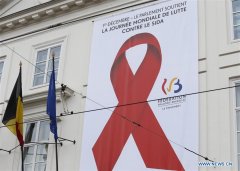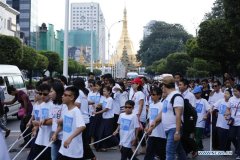Australia to wipe out Hepatitis C in 10 years
CANBERRA, July 28 (Xinhua) -- Australia is on track to eliminate Hepatitis C in ten years if the current trend of people living with the virus getting new antiviral treatment continues, said a new analysis released on Thursday, the World Hepatitis Day.
Minister for Health and Aged Care Sussan Ley said that 20,000 Australians had already begun treatment to cure their debilitating Hepatitis C since the government first listed the breakthrough medicines on the Pharmaceutical Benefits Scheme (PBS) in March 2016.
She said about 5,000 of these Australians have already completed their course of treatment and early-indications show them to be free of the blood-borne liver disease.
Data from the Kirby Institute at University of New South Wales shows that more than 22,470 Australians have already commenced treatment, a massive increase from the 2,000 to 3,000 people with Hepatitis C treated annually prior to the listing.
"Australia is leading the world in the treatment of Hepatitis C, with the most rapid uptake of new treatments seen anywhere in the world, thanks to the unique approach Australia has taken in making these medicines available without restriction." said Professor Greg Dore from the Kirby Institute.
"This represents a huge leap forward in public health. To put this into perspective, we are on track to cure more people with Hepatitis C this year than in the past 20 years of interferon-therapy," he said.
The new treatment is administered as a course of pills that is consumed for three months and has a 90-percent cure rate.
The drugs, which include Harvoni, Sovaldi and Daklinza, previously were prohibitively expensive at 66,000 AU dollars (50,000 U.S. dollars) a course.
Now that the drugs are listed on PBS, patients can access them for 7 to 14 AU dollars (5.25 to 10.5 U.S. dollars) a month if they have a healthcare card, or 36 to 72 AU dollars (27 to 54 U.S. dollars) for everyone else.
Hepatitis Australia CEO Helen Tyrrell said that the wave of people who had been treated was "frankly phenomenal" but that Australia must keep up the momentum in order to make the elimination of Hepatitis C a reality within a decade in Australia.
Hepatitis C is a significant public health issue in Australia. In 2014, it was estimated there were more than 230,000 Australians were living with chronic Hepatitis C, which is a blood-borne virus.
Minister Ley said part of the challenge now was ensuring that people were aware they had the disease and there were cures available at a subsidised rate on the PBS.
"Today's 7th annual World Hepatitis Day is an occasion to celebrate the enormous strides our nation is making in the world-wide effort to eliminate viral hepatitis as a public health concern," she said.
"The Department of Health, Hepatitis Australia and other health care organisations have worked closely to promote testing and access to these new cures and this work will continue until Hepatitis C has been eradicated in Australia for good."
It costs the Australian government 1 billion AU dollars (750 million U.S. dollars) to put the drugs on PBS list. The move makes Australia one of the first countries in the world to publicly subsidise the drugs for their entire population, no matter what a patient's condition is or how they contracted the disease.
In 2010 the World Health Organization made World Hepatitis Day one of only four official disease-specific world health days, to be celebrated each year on the July 28.















